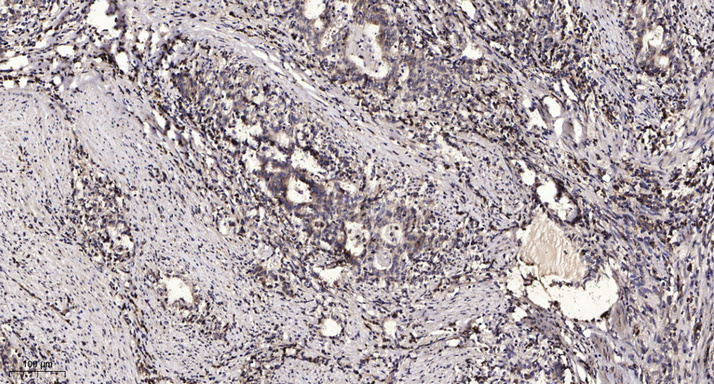PGCA (Cleaved-Ala17) rabbit pAb
- Catalog No.:YC0112
- Applications:WB;ELISA;IHC
- Reactivity:Human;Rat
- Target:
- PGCA
- Gene Name:
- ACAN AGC1 CSPG1 MSK16
- Protein Name:
- PGCA (Cleaved-Ala17)
- Human Swiss Prot No:
- P16112
- Mouse Gene Id:
- 11595
- Mouse Swiss Prot No:
- Q61282
- Rat Gene Id:
- 58968
- Rat Swiss Prot No:
- P07897
- Immunogen:
- Synthesized peptide derived from human PGCA (Cleaved-Ala17)
- Specificity:
- This antibody detects endogenous levels of Human,Rat PGCA (Cleaved-Ala17, protein was cleaved amino acid sequence between 16-17)
- Formulation:
- Liquid in PBS containing 50% glycerol, 0.5% BSA and 0.02% sodium azide.
- Source:
- Polyclonal, Rabbit,IgG
- Dilution:
- WB 1:500-2000;IHC 1:50-300; ELISA 2000-20000
- Purification:
- The antibody was affinity-purified from rabbit serum by affinity-chromatography using specific immunogen.
- Concentration:
- 1 mg/ml
- Storage Stability:
- -15°C to -25°C/1 year(Do not lower than -25°C)
- Other Name:
- Aggrecan core protein (Cartilage-specific proteoglycan core protein;CSPCP;Chondroitin sulfate proteoglycan core protein 1;Chondroitin sulfate proteoglycan 1) [Cleaved into: Aggrecan core protein 2]
- Observed Band(KD):
- 240-260kD
- Background:
- alternative products:Additional isoforms seem to exist,developmental stage:Expression was detected in chondrocytes throughout the developing skeleton.,disease:Defects in ACAN are the cause of spondyloepiphyseal dysplasia type Kimberley (SEDK) [MIM:608361]. Spondyloepiphyseal dysplasias are a heterogeneous group of congenital chondrodysplasias that specifically affect epiphyses and vertebrae. The autosomal dominant SEDK is associated with premature degenerative arthropathy.,domain:Two globular domains, G1 and G2, comprise the N-terminus of the proteoglycan, while another globular region, G3, makes up the C-terminus. G1 contains Link domains and thus consists of three disulfide-bonded loop structures designated as the A, B, B' motifs. G2 is similar to G1. The keratan sulfate (KS) and the chondroitin sulfate (CS) attachment domains lie between G2 and G3.,function:This proteoglycan is a major component of extracellular matrix of cartilagenous tissues. A major function of this protein is to resist compression in cartilage. It binds avidly to hyaluronic acid via an N-terminal globular region.,online information:Aggrecan,PTM:Contains mostly chondroitin sulfate, but also keratan sulfate chains, N-linked and O-linked oligosaccharides. The release of aggrecan fragments from articular cartilage into the synovial fluid at all stages of human osteoarthritis is the result of cleavage by aggrecanase.,similarity:Belongs to the aggrecan/versican proteoglycan family.,similarity:Contains 1 C-type lectin domain.,similarity:Contains 1 EGF-like domain.,similarity:Contains 1 Ig-like V-type (immunoglobulin-like) domain.,similarity:Contains 1 Sushi (CCP/SCR) domain.,similarity:Contains 4 Link domains.,subunit:Interacts with FBLN1.,tissue specificity:Restricted to cartilages.,
- Function:
- skeletal system development, cartilage condensation, chondrocyte differentiation, chondrocyte development,proteoglycan metabolic process, proteolysis, cell adhesion, glycoprotein metabolic process, glycoprotein biosynthetic process, cell-cell adhesion, biological adhesion, proteoglycan biosynthetic process, extracellular matrix organization,collagen fibril organization, extracellular structure organization, skeletal system morphogenesis, cartilage development,
- Subcellular Location:
- Secreted, extracellular space, extracellular matrix .
- Expression:
- Restricted to cartilages.
- June 19-2018
- WESTERN IMMUNOBLOTTING PROTOCOL
- June 19-2018
- IMMUNOHISTOCHEMISTRY-PARAFFIN PROTOCOL
- June 19-2018
- IMMUNOFLUORESCENCE PROTOCOL
- September 08-2020
- FLOW-CYTOMEYRT-PROTOCOL
- May 20-2022
- Cell-Based ELISA│解您多样本WB检测之困扰
- July 13-2018
- CELL-BASED-ELISA-PROTOCOL-FOR-ACETYL-PROTEIN
- July 13-2018
- CELL-BASED-ELISA-PROTOCOL-FOR-PHOSPHO-PROTEIN
- July 13-2018
- Antibody-FAQs
- Products Images

- Immunohistochemical analysis of paraffin-embedded human Gastric adenocarcinoma. 1, Antibody was diluted at 1:200(4° overnight). 2, Tris-EDTA,pH9.0 was used for antigen retrieval. 3,Secondary antibody was diluted at 1:200(room temperature, 45min).


